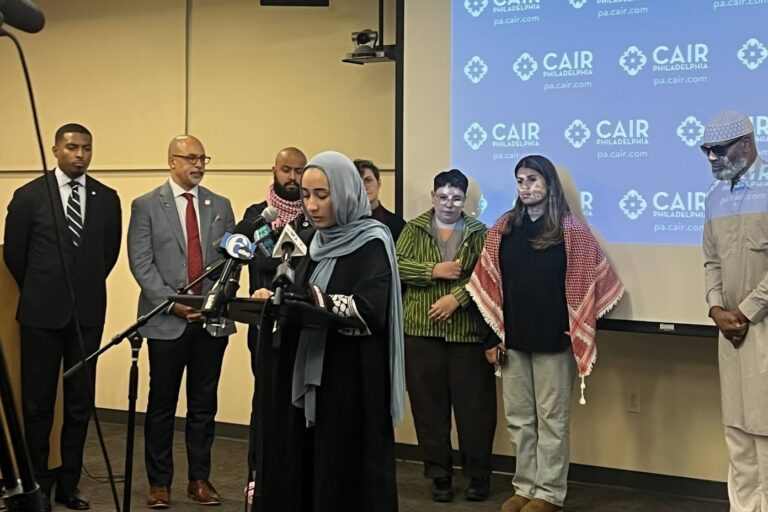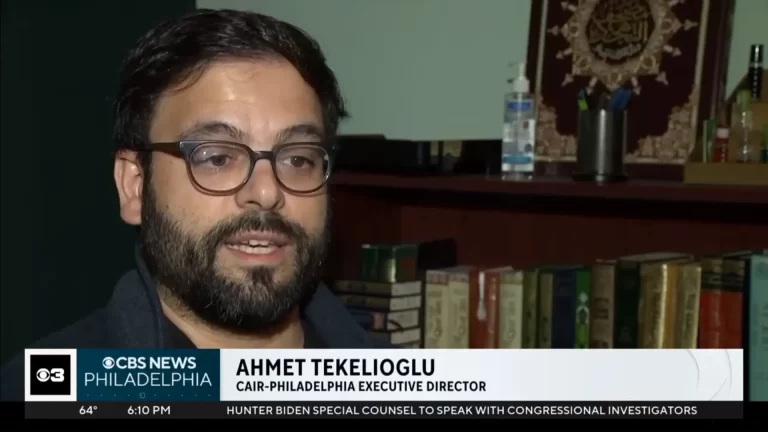![]()
by Maiken Scott
WHYY Newsworks
Many Muslim Americans have kept a low profile in the decade since 9/11. Terrorism has cast a shadow of fear over their communities and places of worship–fear of being suspected, accused or harassed.
In the Philadelphia region, Muslim leaders say their community has become quiet and subdued.
On Sept. 11, 2001, college freshman Moein Khawaja was watching the attacks unfold on television, and the same thought kept popping into his head.
“I kept thinking ‘Please, please don’t let it be Muslims, because if it is, this changes everything.’ And sure enough, it did,'” remembers Khawaja.
Today, Khawaja is the executive director of the Council on American-Islamic Relations’ Philadelphia chapter. He says the initial shock, pain and anger he felt when the terrorists turned out to be Muslim extremists has stayed with him.
“To this day, I feel like al-Qaida attacked me twice, once by murdering so many fellow citizens, but the second time by smearing my faith,” he said.
Khawaja wanted to explain to people what his faith meant to him, how it guided him in being a good son, and good citizen. But many fellow Muslims wanted to retreat, and wait for the storm to pass.
Marwan Kreidie is the executive director of the Philadelphia Arab American Development Corp. In 2001, he was working for the city and immediately started to develop a plan to protect mosques and stores owned by Muslims in case of backlash. He says he disagreed with members of the Muslim community who wanted to keep a low profile. He felt it was important to show that they were Americans who didn’t support radicals.
Initial support erodes
Immediately following the attacks, Kreidie says there was an outpouring of support. Philadelphians stopped by Muslim-owned stores or mosques to embrace their Muslim neighbors. In the decade since, Kreidie said, many members of the Muslim American community have become scared. They have experienced prejudice and discrimination, yet they won’t speak up.
For example, said Kreidie, many kids are bullied in their schools. “The problem is, it’s very difficult for me to get one of these students, or their parents, to confront or change the situation,” Kreidie said. “They feel like they are going to be deported, or they are going to lose their rights for this or that, which they won’t, but their feeling is ‘I don’t want to bug the system.'”
But that very attitude, says Kreidie, is at the heart of the problem.
“The great thing about America is it works if everybody is active and participating as citizens, what’s not great is when people withdraw from society,” he said. “I think you see people doing that and being quiet and not bringing up their points of view.”
Kreidie says some Muslim refugees have left the U.S. because they felt they couldn’t make a life here.
Alyaa Abood is a recent immigrant. Born and raised in Iraq, she came to the U.S. after her life was threatened for working with the American forces as a translator. She is happy to be here, but she says it’s been a struggle:
“It’s tough, you meet people who always see you as a foreigner, and because you are an Arab, because you are a Muslim, you never have a chance to work for them,” said Abood. “People are judgmental, not all of course, some are very nice, but some are very judgmental. But I have to say, the last four years was never easy, and I don’t think it’s yet easy.”
Prejudice, suspicion, and the fear of being associated with radicals also have silenced certain conversations within the Muslim community, says Moein Khawaja
Silencing discussion
“Mosque leadership doesn’t want to be associated with anybody who expresses anything extreme,” said Khawaja. “So whenever someone expresses something out of the ordinary, they are asked to leave. Where there might be an opportunity to talk to somebody, get them to calm down, but instead, they are asked to leave.”
Khawaja said the threat of home-grown terrorism is minimal; however he is worried that this silencing will drive people who are flirting with radical ideas into chat rooms, where they could potentially connect with others.
He says Muslim American leaders are working hard to reach out, educate, and connect. They are encouraging members in their community to speak up, be active citizens, and describe who they are and what they stand for, rather than being defined by a culture of fear.





